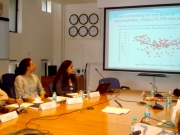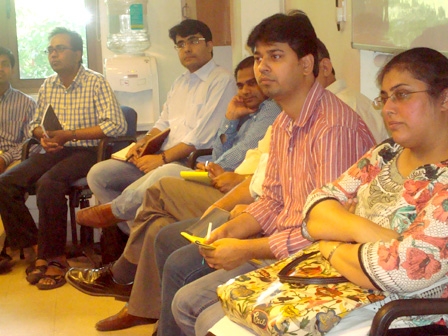At this seminar, Sonali Jain-Chandra and Sonali Das from IMF, presented a paper that examines the determinants of female labor force participation in India, against the backdrop of one of the lowest female participation rates among its peers. Using extensive Indian household survey data, the paper models the labor force participation choices of women, conditional on demographic characteristics and education, as well as looking at the influence of state-level labor market flexibility and other state policies. The main finding is that a number of policy initiatives can help boost female economic participation in the states of India, including increased labor market flexibility, investment in infrastructure, and enhanced social spending. Rinku Murgai, Lead Economist from the World Bank, as the discussant for the seminar, took forward the conversations with the audience.
Sonali Jain-Chandra is Deputy Division Chief in the IMF’s Asia and Pacific Department. She has wide-ranging country experience on India, Korea, Indonesia, Cambodia, Nepal and Bhutan. She was also a member of the Regional Studies Division and has often contributed to the IMF’s Regional Economic Outlook. Prior to her current assignment, she worked in the IMF’s Strategy, Policy and Review departments on vulnerabilities in emerging markets and advanced economies. Her research focuses on labor markets, capital flows, international banking linkages, and financial inclusion. She holds a PhD in Economics from Columbia University, a BA and MA in Philosophy, Politics and Economics from Oxford University and a BA in Economics from Lady Shri Ram College, University of Delhi.
Sonali Das is an Economist in the IMF’s Asia and Pacific Department, where she focuses on India and Nepal. Previously, she was in the IMF’s Strategy, Policy, and Review Department, where she worked on the IMF program with Pakistan and policy papers on the international monetary system. Prior to joining the IMF in 2012, Sonali interned at the Brookings Institution, the Federal Reserve Bank of San Francisco, as well as the IMF. She received her PhD in Economics from Cornell University, an MA in Economics from McGill University, and a BSc from the University of Toronto. Her research interests are in banking, financial interconnectedness, and economic development.
Rinku Murgai is a Lead Economist in the Poverty Global Practice of the World Bank. Rinku joined the World Bank in 2000 as a Young Professional, with assignments in the South Asia Poverty Reduction and Economic Management Unit and the Research Department. In 2003, she relocated to the New Delhi office and has been working in India since then. She has a keen interest and analytic skills in the general areas of poverty, vulnerability and public policy, encompassing poverty and inequality measurement. In her work at the World Bank, Rinku has had the opportunity to contribute to poverty assessments, development policy reviews, impact evaluations, operations, and Country Partnership Strategies. She has worked closely with government on issues related to poverty monitoring, strengthening of statistical systems, and design and M&E of safety nets. She holds a Bachelor’s degree in Biology and Economics from Swarthmore College, and a PhD in Agricultural and Resource Economics from the University of California at Berkeley.










